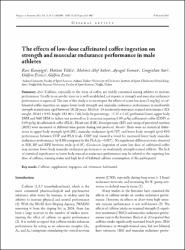The effects of low-dose caffeinated coffee ingestion on strength and muscular endurance performance in male athletes

View/
Date
2021Author
Karayiğit, RaciYıldız, Hakan
Şahin, Mehmet Akif
Şişman, Ayşegül
Sarı, Cengizhan
Ersöz, Gülfem
Büyükçelebi, Hakan
Metadata
Show full item recordCitation
Karayigit R, Sahin MA, Sari C, Sisman A, Yildiz H, Buyukcelebi H, Ersöz G. The effects of low-dose caffeinated coffee ingestion on strength and muscular endurance performance in male athletes. Progr Nutr [Internet]. 2021 Mar. 31 [cited 2021 Apr. 29];23(1):e2021001. Available from: https://www.mattioli1885journals.com/index.php/progressinnutrition/article/view/9067Abstract
Aim: Caffeine, especially in the form of coffee, are widely consumed among athletes to increase performance. Its effects on aerobic exercise is well-established, yet reports in strength and muscular endurance performance is equivocal. The aim of this study is to investigate the effects of acute low dose (3 mg/kg) of caffeinated coffee ingestion on upper-lower body strength and muscular endurance performance in moderately strength trained men aged between 18-26 years. Methods: 14 moderately resistance-trained men (mean } SD: weight- 82.64 } 9.92, height-181.00 } 7.68, body fat percentage- 15.25 } 5.43) performed lower-upper body 1RM and %60 1RM to failure test protocol on 2 occasions ingesting 0.09 gr/kg caffeinated coffee (COF) or 0.09 gr/kg decaffeinated coffee (PLA). Heart rate (HR), blood pressure (BP) and rating of perceived exertion (RPE) were measured at different time points during test protocol. Results: There were no statistical differences in upper body strength (p=0.281), muscular endurance (p=0.727) and lower body strength (p=0.414) performance between COF and PLA trials. COF trial showed a trend for increased lower body muscular endurance performance by 8.8% compared to the PLA (p = 0.057). No significant differences were observed in HR, BP and RPE between trials (p>0.05). Conclusion: Ingestion of acute low dose of caffeinated coffee may increase lower body muscular endurance performance on moderately strength trained athletes. The lack of statistical significance in lower body muscular endurance performance may be related to the ingesting low dose of caffeine, training status and high level of habitual caffeine consumption of the participants'.

















